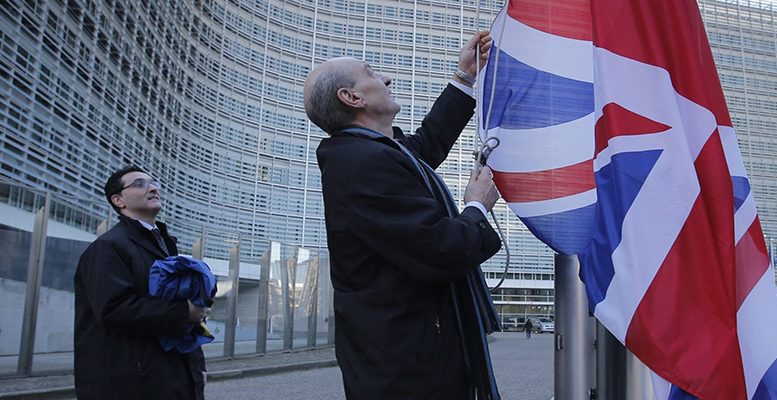DWS | Sometimes, it is better to remain silent than to speak up and remove all doubt about your ignorance. Having been inundated by comments on what to make of the latest twist in the Brexit drama, however, we too feel compelled to add our bit. Amidst all the recent turbulence, we believe three conclusions can already be drawn, none of them particularly comfortable for British financial markets.
1. British politics is in turmoil. It will take a while for the dust to settle.
It looks increasingly likely that Prime Minister Theresa May will face a leadership challenge within her conservative party. Her minority government has been weakened, perhaps fatally, by a series of resignations. That includes Dominic Raab, May’s second Brexit secretary to quit within four months. The rollout of the draft deal the May government negotiated with Brussels was pretty disorganized, to put it mildly. And, while it is debatable whether any other prime minister might have negotiated a deal more favorable to British interests, Mrs. May has done very little to prepare either her party or the country for some harsh realities. That starts with the thorny issue of how to avoid border checks between Northern Ireland and the Republic of Ireland, even in the absence of a future trade agreement. May’s opponents, including former foreign secretary Boris Johnson, were easily able to paint the resulting provisions as amounting to potentially condemning the United Kingdom to the status of a “vassal state”. Matters were not helped either by the absence of any substantive details on the future trading regime that might emerge after the transition period. It certainly appears that if the House of Commons were to ratify anything like the draft deal now proposed, the UK would lose much of its remaining bargaining power it might once have had in future trade talks.
2. Anyone claiming to know with any degree of comfort what will happen next is deluding them- selves – and their readers.
Don’t take our word for it. Here is how veteran Tory MP Ken Clarke put it on Thursday, when interviewed by the BBC’s Radio 4 World at One program: “Nobody really knows what’s going to happen from now on. The actual vote on this draft deal won’t come for a few weeks yet and there is still some final negotiating to do. But at the moment, there is not the slightest chance of a parliamentary majority.” When pressed on whether the deal might be softened, Clarke added: “Like everybody else from Theresa downwards, I think, I don’t know. Nobody knows quite what happens next.” To which we would only add that given the negative reception so far, it would not be surprising if May’s draft deal never even gets to a parliamentary vote.
3. Political uncertainty looks set to continue, and not just in terms of Brexit negotiations.
A charitable view of what happened over the past week is that Westminster has actually moved closer to delivering on what voters might have wanted. On Brexit, only an admittedly sizeable minority was ever in favor of swiftly severing relations with the European Union (EU) altogether, by leaving without a deal. Polling, both before and after the 2016 referendum, has been pretty unambiguous on that. A larger group, of about half of voters has been broadly in favor of the status quo, perhaps on slightly amended terms notably on the movement of people. Back in 2016, the group that appears to have narrowly swung the referendum in favor of Brexit, felt it would be easier to secure concessions by exiting the EU. Unsurprisingly, such reluctant Brexiteers do not appear particularly pleased by the results May has been able to deliver. We would caution not to read too much into any one, early poll (especially given how unreliable British polling has been in the past). Still, it looks like only 14% would choose Brexit on the terms negotiated by the government, and only 32% would prefer to leave the EU without a deal. Over half – 54% – would prefer to remain in the EU. Give or take a few points, this is broadly consistent with what you might have ex- pected.
The problem is that parliamentary politics is an imprecise way of aggregating voter preferences. Faced with legalistic, intransigent and increasingly impatient European partners, British brinkmanship paired with political chaos still risks delivering an outcome only relatively few voters ever wanted. And even if this can be avoided, there are worrying longer-term implications for investors. Under Theresa May, the Tories appear to have once again been losing their reputation for being competent at managing the economy. Beyond Brexit, the electoral consequences could prove as significant and lasting as those of Black Wednesday of 1992, when markets forced the conservative government to withdraw the pound form the European Exchange Rate mechanisms. The difference is that this time around, the opposition Labour party is embracing a series of policies British businesses and financial markets would find deeply unnerving.
To sum up, from a market perspective, extreme outcomes have become more probable. That includes both outcomes that would prove detrimental to British financial markets and economic prospects (ie. a chaotic, hard Brexit) and more benign ones than we had previously expected. For example, it looks no longer so implausible that the UK might request an extension of EU membership, potentially followed by a second referendum. We have previously advised clients to stay on the sidelines, until Brexit-related political uncertainty recedes. In light of recent events, we can only reiterate that advice.





